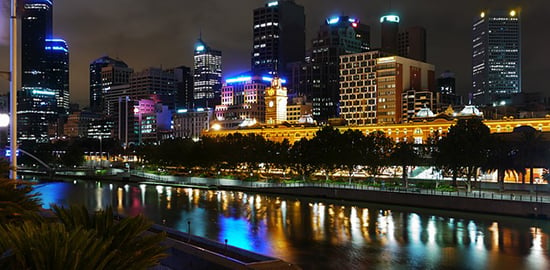First evaluation of 24-hour PT shows it’s not making Melbourne safer
Media release
Melbourne’s 24-hour public transport timetable has failed to improve night-time safety in the CBD, according to new Deakin University research.
The study, published in a recent edition of the Journal of Studies on Alcohol and Drugs, showed no improvement to key safety indicators in the 12 months after its implementation, despite one of the publicised intentions of the State Government’s extension of public transport hours being to get Melbournians ‘home safe’.
The new research from Deakin’s School of Psychology is the first analysis of the 24-hour public transport system’s impact on alcohol-related harms. It compared data on police recorded assaults, ambulance attendance, road crashes, public transport use, and pedestrian numbers, from 2015 to 2016 when the initiative was introduced.
It found no change when it came to city assaults, ambulance attendances in the CBD, or road crashes in the areas serviced by extra public transport hours.
Research fellow Dr Ashlee Curtis, the study’s lead author, said one of the key focuses on promoting the extension of public transport between 1am and 5am on weekends was its promise of reducing harm in nightlife and getting people home safe.
“But our data shows there was no positive or negative outcomes here, it didn’t really change anything," Dr Curtis said.
"While it didn’t make things worse, it hasn’t really had the impact that it was supposed to."
Dr Curtis said she was not particularly surprised by the results.
"Public transport availability has been argued as a way to reduce alcohol-related harms through the dispersal of patrons away from nightlife precincts, and through reduction in the number of people choosing to drive under the influence," she said.
"But there’s also the worry it could have the unintended opposite effect, encouraging patrons to stay out later and drink more, because they have a cheap transport option home.
"This is especially concerning because we know after midnight the frequency of harmful incidents, including assaults, increases."
Senior researcher Deakin School of Psychology Professor Peter Miller said the main group the changes had seemed to benefit were the city’s nightlife businesses, which was unsurprising given the industry had consistently advocated for the measures.
"The findings make it clear that the $300 million expended on this measure have not reduced alcohol-related violence in Melbourne, which continues to clog up our emergency departments, and waste valuable police and ambulance resources every Friday and Saturday night," Professor Miller said.
In a related research project, the Deakin team surveyed four late-night venues and nearly 200 patrons in the months before and after 24-hour public transport was introduced.
Adjusting for seasonal differences, it found patron intoxication increased significantly after the introduction of 24-hour public transport, and those on a night out reported staying out longer drinking and spending more, on average.
Professor Miller said there was an increased police presence introduced alongside the extended public transport, which may have had a deterrent on the number of assaults.
"Like responsible governments in Queensland and the Northern Territory, it is time the Victorian Government publicly reviewed evidence-based measures that reduce alcohol-related harm and save taxpayer funds," he said.
"These include measure such as last drinks at 3am, limiting the sales of extremely cheap alcohol, or replicating the effective ‘Violent Venues’ scheme in NSW, which only targets risky venues and has consistently reduced violence and injury across the state."
Share this story

